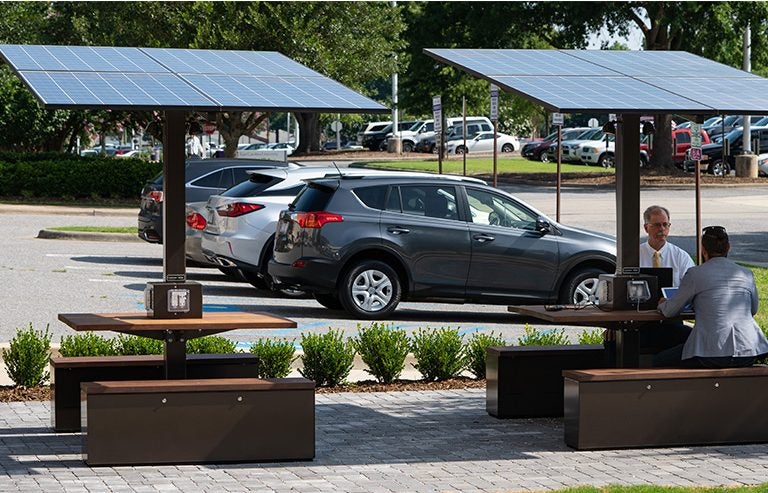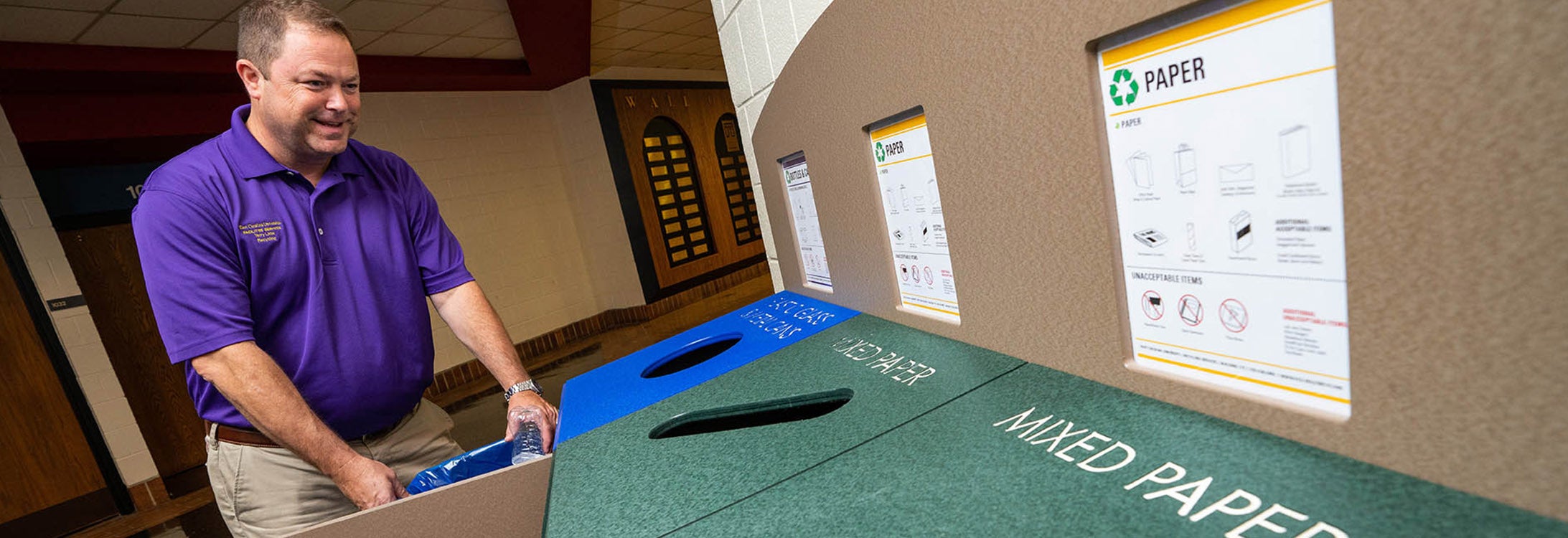COMMITMENT TO SUSTAINABILITY
ECU adopts five-year plan for a greener campus
With a flourish of his (digital) pen, East Carolina University Chancellor Cecil Staton has signaled his approval of the newly developed ECU Sustainability Plan, which outlines five-year goals in the areas of climate change mitigation, academics and research, campus grounds, and materials management.
“Being good stewards of our environment and natural resources requires individual responsibility and campuswide engagement, but it also demands that we assume a leadership role in our region,” Staton said. “Sustainability is not just a one-and-done project. It is an ongoing commitment to a more thoughtful approach to the way we live, the way we learn, and the way we grow our university and the communities around us.”

A pair of solar tables with lights and charging stations was installed last summer outside the Brody School of Medicine.
More than 60 faculty, staff, students and members of the community participated in developing the plan over the past year, said Chad Carwein, who came to ECU in 2016 as its first sustainability manager. “It has been a big undertaking — a lot of challenges, but also a lot of opportunity.”
ECU has had a recycling program since 1990 and has recently rolled out new initiatives such as the LimeBike program and the installation of a pair of solar-powered tables with charging stations at the Brody School of Medicine. Those efforts have already had an impact, as ECU recently received a score of 88 out of a possible 99 on the Princeton Review’s Sustainability Report and was included in its “Guide to 399 Green Colleges.”
But there’s ground to make up when compared to other schools in the UNC System.
“The UNC System has a sustainability policy that was adopted in 2009,” Carwein said. “It lays out goals and objectives for all 17 member institutions across the state of North Carolina. One of those goals is reducing energy consumption by 40 percent by 2025. We’re a little bit over halfway towards that goal. … But those next 15 percent are going to be even harder than the first 25.”
The sustainability plan sets goals in each of four categories and outlines specific strategies to achieve those goals.
Lisa Bjerke, program manager for GreenerU, a sustainability company that helped develop the plan, said it’s important for the goals to be visionary, realistic and measurable. “We want to be realistic and honest and hold ourselves accountable,” she said. “They are measurable goals that you will have met or not met by the end.”
The list of goals and strategies includes cutting greenhouse gas emissions 5 percent, adding an academic sustainability coordinator position, reducing reliance on potable water for irrigation and improving stormwater management, and reducing consumption of disposable products.
Bjerke said the team used data from the Sustainability, Tracking, Assessment and Rating System (STARS) to narrow its focus, looking to build on existing strengths but really honing in on areas with room for improvement. Overall, ECU earned a STARS bronze rating in 2017, which the team views as a foundation to continue its efforts.
Carwein said he’s most excited about the academic aspects of the plan because of the potential for exponential impact.
“Simply put, we could take the university off the grid tomorrow. The technology is there; if we had unlimited funding, we could do it,” he said. “But that’s not going to put a dent in global climate change.
“Where we have an opportunity to make a real impact is educating students, and by integrating it into their coursework, into their projects, into their research, we can make a much bigger difference because they’ll take it out and embrace it in their personal lives as well as their professional careers.”
Among the academic and research initiatives laid out in the plan is the development of an interdisciplinary environmental studies or sustainability studies minor. That idea excited Kyle Swanson, a graduate student in biology, who said it would help attract students and faculty members who are interested in and committed to sustainability.
“Having the plan in general is exciting for me,” Swanson said. “For my undergrad I went to Humboldt State, and they have an entire club devoted to recycling. Coming here, it’s painful not having that kind of resource available. So seeing something that shows that we really want to get this implemented and get it started is something I really wanted to see.”
The plan aligns with ECU’s strategic plan and its comprehensive campus master plan, said Sara Thorndike, vice chancellor for administration and finance. “It will help guide the university leadership on sustainability in the eastern North Carolina region and provide direction for on-campus improvements,” she said. “We are especially proud of how this plan builds on the history of ECU, is created by members from both the campus and the local community, and connects ECU’s strengths in engineering, public health, diversity, social entrepreneurship, service learning and community engagement.”
“I really look forward to implementing this plan,” Carwein said. This is the future of making our campus and our workplace more sustainable, and we need everybody on board. Sustainability is a team sport.”
The ECU Sustainability Plan is available here.

Chad Carwein, sustainability manager, introduces the ECU Sustainability Plan to the university community.
